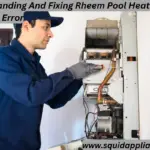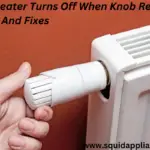Have you ever wondered why your oven element burns out frequently? In this article, I will delve into the four common causes behind this frustrating issue. As someone who has experienced the annoyance of a burnt-out oven element, I understand the importance of uncovering these causes to prevent future occurrences.
Firstly, excessive use can lead to overheating, causing the elements to burn out. This is especially true if you frequently bake or roast at high temperatures for extended periods.
Secondly, poor maintenance and cleaning habits can contribute to element failure. Neglecting regular cleaning allows grease and food debris to accumulate on the surface of the elements, reducing their efficiency and lifespan.
Furthermore, electrical surges and power fluctuations can also damage oven elements. Sudden spikes in electricity supply or inconsistent voltage levels put immense strain on the elements, leading them to burn out prematurely.
Lastly, using defective or low-quality elements during installation can result in early failures.
By understanding these common causes and taking necessary precautions such as proper maintenance practices and using high-quality elements during installation, you can ensure that your oven’s heating system functions optimally for longer periods without burning out unnecessarily.
Why Do Oven Elements Burn Out?
Yes, oven elements burn out due to excessive use, poor maintenance, electrical surges, and low-quality elements. Overheating from frequent high-temperature use, neglecting cleaning, and power fluctuations can cause premature burnout. Proper maintenance and using high-quality elements can extend their lifespan.
Key Takeaways
- Excessive use, poor maintenance and cleaning habits, electrical surges and power fluctuations, and using defective or low-quality elements during installation are the four common causes of oven element burnout.
- Excessive use can lead to longer preheating times and inconsistent temperature control, while visible damage like discoloration or cracks can indicate excessive use.
- Regular cleaning of elements is necessary to prevent burnout, as neglecting maintenance and cleaning habits leads to premature deterioration.
- Surge protectors, proper grounding, and investing in reliable elements are crucial to prevent damage and ensure optimal cooking performance.
Overheating Due to Excessive Use
You’ve been baking up a storm, and your oven elements couldn’t handle the heat! Preventing overheating is crucial to avoid burning out your oven elements.
Signs of excessive use include longer preheating times, inconsistent temperature control, and visible damage like discoloration or cracks.
To prevent this, make sure to follow recommended usage guidelines, avoid overcrowding the oven, and regularly clean the elements to remove any built-up residue.
Poor Maintenance and Cleaning Habits
Neglecting proper maintenance and cleaning habits can lead to the premature deterioration of oven components. Improper care and neglectful cleaning are two major factors that contribute to the burning out of oven elements.
When food particles, grease, and other debris accumulate on the heating element, they create a barrier that hinders efficient heat transfer. This causes the element to work harder, resulting in overheating and eventual burnout.
Regularly cleaning your oven and practicing proper maintenance can help prevent these issues.
Electrical Surges and Power Fluctuations
Electrical surges and power fluctuations can wreak havoc on the delicate components of your oven, potentially leading to costly repairs or even a complete breakdown. Voltage spikes, which are sudden increases in electrical voltage, can overload and damage the heating element in your oven.
These spikes can occur due to lightning strikes, faulty wiring, or problems with the power grid. It’s crucial to use surge protectors and ensure proper grounding to prevent appliance damage from these unpredictable power fluctuations.
Defective or Low-Quality Elements
Sometimes, it’s easy to overlook the importance of using high-quality components in your oven, but opting for cheaper or defective elements can lead to frustrating cooking experiences and a less-than-perfect meal.
When it comes to oven elements, their lifespan can be affected by defects or low quality. Signs of a defective element include uneven heating, visible damage like cracks or burn marks, and frequent burnouts.
Investing in reliable elements is crucial for maintaining optimal cooking performance.
Incorrect Installation or Usage
Improperly installing or using your oven can result in subpar cooking experiences and a less-than-desirable meal. To ensure proper installation techniques, follow the manufacturer’s instructions carefully. Common usage mistakes include placing aluminum foil directly on the oven element, which can cause it to overheat and burn out prematurely.
Additionally, avoid using abrasive cleaning materials on the element as this can damage its protective coating. Remember to always handle and use your oven with care to prolong the life of its elements.
| Proper Installation Techniques | Common Usage Mistakes | |
|---|---|---|
| 1 | Follow manufacturer’s instructions carefully | Placing aluminum foil directly on the oven element |
| 2 | Ensure proper electrical connections | Using abrasive cleaning materials on the element |
| 3 | Check for any signs of damage before installation | Overloading the oven with heavy dishes |
| 4 | Regularly inspect and clean the elements | Neglecting routine maintenance tasks |
Frequently Asked Questions
Can a burnt-out oven element be repaired, or does it need to be replaced?
A burnt-out oven element cannot be repaired and needs to be replaced. There is no way to fix the damage once it has occurred. The only solution is to replace the element with a new one.
Are there any warning signs to indicate that an oven element is about to burn out?
Some warning signs that an oven element is about to burn out include uneven cooking, longer cooking times, and visible damage. To prevent this, regularly clean the oven and inspect the element for any signs of wear or damage.
Can using the self-cleaning function on my oven lead to the oven element burning out?
Using the self-cleaning function on your oven can potentially lead to the oven element burning out. To prevent this, it is important to follow best practices for maintaining oven elements and be aware of the potential dangers.
Is it possible to prevent oven elements from burning out by using a surge protector?
Surge protectors are not effective in preventing oven element burnout. Alternative prevention methods include regular cleaning, avoiding extreme temperatures, using the oven according to manufacturer guidelines, and replacing worn-out elements promptly.
Are there any specific cleaning products or methods that should be avoided to prevent damage to oven elements?
To prevent damage to oven elements, avoid using harsh cleaning products such as bleach or abrasive cleaners. Instead, opt for gentle cleaners specifically designed for ovens. The best cleaning method is to wipe the elements with a damp cloth or sponge after they have cooled down.
Conclusion
In conclusion, oven elements can burn out due to various factors. Excessive use and lack of proper maintenance can cause them to overheat and deteriorate over time. Electrical surges and power fluctuations can also contribute to their failure.
Additionally, using defective or low-quality elements or incorrect installation methods can lead to premature burnouts.
To ensure the longevity of your oven elements, it’s crucial to follow recommended usage guidelines, conduct regular cleaning and maintenance, and invest in high-quality components.






